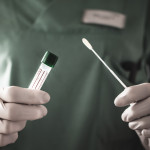People with HIV who are on antiretroviral (ARV) treatment apparently respond as well to treatment for certain forms of lymphoma as HIV-negative individuals, aidsmap reports.
Publishing their findings in the journal Haematologica, researchers conducted an analysis of members of 387 members of the German HIV Lymphoma Cohort. Since 2005, the members of the cohort were treated for diffuse large B-cell lymphoma (DLBCL), Burkitt lymphoma (an aggressive form of non–Hodgkin lymphoma), plasmablastic lymphoma (PBL) or non-classifiable B-cell lymphoma.
A total of 254 members of the cohort (66 percent) included in this study achieved remission from lymphoma after one course of treatment, while 21 did so after additional chemotherapy. Twenty-two achieved partial remission, defined as a 50 percent or greater reduction in the mass and no further spread of the lymphoma. Fifteen were still undergoing chemotherapy when the researchers conducted their analysis. Eighty-five people did not respond to treatment, including 23 who died while receiving treatment, 45 whose disease progressed and seven who did not receive treatment for lymphoma.
The study included a median 4.6 years of follow-up data on individuals after they achieved a full remission from lymphoma. During that time, 11.4 percent saw their disease relapse. This was comparable to a 6 to 10 percent relapse rate for DLBCL and a 12 percent Burkitt lymphoma relapse rate seen among HIV-negative individuals who received similar lymphoma treatment regimens.
The proportion of those in the HIV cohort who survived five years without a relapse of their lymphoma was 88.4 percent for those with DLBCL, 88.9 percent for those with Burkitt lymphoma, 88.6 percent for those with plasmablastic lymphoma and 57.1 percent for those with unclassified AIDS lymphoma.
According to the study authors’ statistical analysis, factors associated with a greater likelihood of relapse of lymphoma included: a higher Ann Arbor score of Stages III or IV (meaning the lymphoma was more disseminated), which was associated with a 4.85-fold greater likelihood of relapse; not taking ARVs during chemotherapy (4.28-fold increased likelihood); receiving R-CHOP chemotherapy (7.59-fold increased likelihood); and having non-classifiable lymphoma (5.08-fold increased likelihood).
To read the aidsmap article, click here.
To read the study abstract, click here.







Comments
Comments